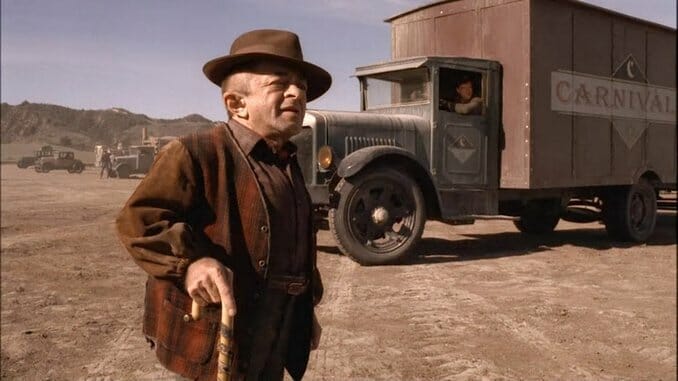TV Rewind: Why HBO’s Carnivale Should Have Been Prestige TV’s First Big Fantasy Hit
Few television shows have so thoroughly rewarded viewer patience and attention to detail.
Photo Courtesy of HBO
Editor’s Note: Welcome to our TV Rewind column! The Paste writers are diving into the streaming catalogue to discuss some of our favorite classic series as well as great shows we’re watching for the first time. Come relive your TV past with us, or discover what should be your next binge watch below:
![]()
“To each generation, was born a creature of Light and a creature of Darkness.
And great armies would clash by night in the ancient war between good and evil.
There was magic then, nobility, and unimaginable cruelty.
And so it was until the day that a false sun exploded over Trinity, and man forever traded away wonder for reason.”
Thus runs the opening monologue of HBO’s Carnivale, a dark, magical tale of good and evil, wonder and madness, apocalypse and rebirth. And a show that far, far too many people have likely never seen.
Yet, if its language and tone still sound familiar anyway that’s probably because it’s precisely the sort of big, swing for the fences-style bombast that we, as viewers, have been conditioned to expect from our prestige science fiction and fantasy television in recent years. From Game of Thrones to Watchmen, and Lost to Westworld, we’re looking for genre stories with distinct perspectives and something to say, ones that attempt to push our understanding of humanity forward as we untangle lavishly complex narrative arcs.
And, to be fair, many of those shows did just that. It’s just that Carnivale did it first.
A slow-burn retelling of the age-old battle between light and darkness set in the middle of the Dust Bowl, Carnivale originally premiered in 2003 and follows the story of a traveling circus run by a mysterious figure known only as Management. Packed with its share of misfits and miscreants, the group picks up a young man named Ben Hawkins (Nick Stahl) who has mysterious healing powers and a complicated past. Meanwhile, across the country in California, a Methodist preacher known as Brother Justin (Clancy Brown) begins to display strange abilities of his own, and uses them to build a new ministry. As the carnival travels through dead-end communities and literal ghost towns, surprise connections between Ben and Justin begin to unfold and the show inexorably builds toward a confrontation between the two men.
Sort of. That may be the most basic way to explain the story of Carnivale, but it hardly covers the many gorgeous, frustrating, gloriously weird elements of this truly singular show that ultimately deserved so much more attention than it got.
Truly a series ahead of its time, Carnivale whole heartedly embraced a multi-season story arc that involved grisly flashbacks, apocalyptic visions, and the sort of complex internal lore that often needed a flow chart to explain. Had it had arrived on HBO’s lineup just five short years later, the show probably would have been a massive cultural hit—think Westworld on steroids, with Reddit users debating the hidden meanings of the tarot cards, and physically mapping the carnival’s trek through the remnants of broken and abandoned towns.
-

-

-

-

-

-

-

-

-

-

-

-

-

-

-

-

-

-

-

-

-

-

-

-

-

-

-

-

-

-

-

-

-

-

-

-

-

-

-

-








































